TRANSCRIPT: John Calipari's Offseason Press Conference
John Calipari hopped on Zoom this morning to update reporters on a variety of topics including his new team, NIL, his son Brad joining the coaching staff, and even his own breakthrough case of COVID-19. We’ve shared plenty from the press conference so far, but if you’d like to read a transcript of the 45-minute conversation, enjoy below.
QUESTION: First of all, thanks for doing this. Appreciate it very much. Looking at your roster, this is a roster mix unlike any you’ve had here: returning players, three freshmen, four or five transfers. What are the challenges? What’s easier about it? What may be even be more difficult about it as far as building the team this early?
JOHN CALIPARI: We dabbled in the transfer market, as you know, most of it being graduate transfers, and they added something to every team that we had. This year, because of the rule, we also took a couple undergraduate transfers who are going to add to this team.
But if you think about my best teams, we had really good young talent, but there was veteran leadership within the team. I had one team that went to the final game that started five freshmen. That is unusual. But this is more like a team that we’ve got depth.
They’ve done some really good stuff together the seven, eight weeks this summer. They came together as a team. They did good stuff. They started, since they’ve come back, doing team things. You never see one or two guys. You see six or seven.
There’s going to be great competition, but it’s good competition. It’s going to bring out the best of guys.
Q. Cal, I wonder after last season if there’s anything, as you sort of self-evaluate and evaluate the program and all that – obviously, there’s a bunch of new faces, there’s new coaches – just philosophically that you’ve maybe changed in your mind or want to change going forward.
JOHN CALIPARI: Here’s what I’ll say to everybody: That year was awful for a bunch of coaches, but it was awful for everybody. My thing is I’m moving on. I’m excited about coaching. That’s going to be a blip in the screen.
It was painful for every one of us to go through. Every one of us. And I’m not talking just coaches, everybody, every student. It was painful. At this point, I’m not looking back. I don’t have the rearview mirror. I’m looking forward.
All I would say to everybody is I’m jacked about where we are, where we’re going, how the recruiting’s going, all that. You could tell that I’m like let’s go, let’s get this started.
Great group of young people. How about they come together and say, well, we’re going to do name, image and likeness, but we’re going to give 10% back to charity. Who does that when you’re 18 and 19? That means we’ve got some good senior leadership. They did, I just learned this morning, kickball. I went, kickball? Where did they do it? Did they all do it? Who showed up? What was it about?
They’re engaging their fans. That’s what this program is. We’ve built a culture in basketball here over my time that’s about fan engagement. It’s about, yeah, what you’re doing between the white lines and how you come together and it’s about work. It’s about competitiveness. It’s about learning to fight. It’s about betting on yourself. It’s about being responsible for you. It’s not about being a victim.
I don’t want to sit here and go over that. Look, no one wants to hear, well, this, that, and the other, but I’ll tell you, for all of us, it makes us appreciate what we have, how we do things, things that showed us that work. But you know what, time to move on. Let’s go, next year. Thank goodness we got through last year, and we did.
Q. Cal, given the way last season went for him just as a team, I don’t know that anyone would have blamed Davion (Mintz) for just saying it’s time to start a pro career or get paid to play. What did you see in the way he was able to embrace this program and make the decision to come back even with all the stuff that went on last year in terms of no fans, the record, all of that?
JOHN CALIPARI: Davion was one of the most appreciative young people I’ve been around. He made statements to me about this program. He’d look at me and say, “You saved my life.” What are you talking about? “Coach, you gave me a chance. You breathed life into me again so I could do what I love doing.”
He ran the gamut, and I told him to. Run the gamut to see if there are any opportunities out there that you can take advantage of. He finally called and said, “Coach, I’m going to come back. I’m going to do one more run at this.” So it gives us a veteran, and it gives us–again, now the competition is different. The players are different. That may play out somewhat different. I don’t know. That will happen on the court, and it’s always decided by the players.
I’m happy he’s here. I love being around him. How about I met his family in person for the first time two days ago? I never got to meet his family, and I met his family. And they’re great people.
I invited them into practice. “Have you all been vaccinated? OK, great. You can all come in and just wear a mask and watch us practice.” Stuff that you guys and ladies know we’ve always done that here. Practices are open to basically everybody, except you guys. It is open to where people, if they want to see their child or they want to watch us, this thing is available.
Q. You talk about the competition is going to be different, especially at point guard. What’s it going to be like there? Do you hope just one guy emerges, or are you comfortable with all the different options you’re going to have?
JOHN CALIPARI: We got three that can play the position. Sahvir (Wheeler)–I did some things. We’re putting in a press I used in the past. I didn’t know where I wanted to put him because of his size. He goes, “Coach, I’m almost 6-5 (with a wingspan) and I went, “OK.” So, I put him at the front of the press. He’s almost 6-5.
Normally, you put that guy as an interceptor. You need someone in the front line that’s going to occupy. TyTy (Washington Jr.) is better than I thought. A demeanor, plays the game as it comes, skilled — floaters, jump shots, making passes. Decision-making not quite there.
So, you got those two. One, they can play together, and as you know, I played three point guards at the same time in the past at times too. And you’ve got Davion who can, as we learned late in the season, he can play the position more as a scoring kind of guard than a creating point guard for his team, but he still can play it. So, we’ve got three, and I’m really excited about all three.
Let me throw another one: Kellan (Grady) played point guard at times at Davidson. In fact, when we played him when he had 16 on us as a freshman, he was their point guard. So, we have options, and I’m really excited.
Seeing how they’re playing, I think it’s, again, brought guys together because it’s really about playing for each other, and I think that’s helped us too.
Q. You kind of mentioned it before about recruiting and momentum and going pretty good. What do you think the difference is for you guys in recruiting? Because it seems like you guys have got some momentum right now that you haven’t had in a while.
JOHN CALIPARI: I think we’ve had the No. 1 or 2 class every time I’ve been here, but you may be right, we may not have the momentum. I think we’ve missed on some guys, which I’ve always said it, we will. We don’t get everybody.
I was talking to a coach yesterday and Orlando (Antigua) was in there listening, and it was basically so and so promised the kid he would start, and the coach said, “Look, I’ve got to do it because other people are doing it.” And you guys know I don’t do that.
So there are some kids that want to be told you’re going to start, you’re going to shoot the ball 20, 25 times a game, you’re going to be the main guy, that kind of thing. Most of it isn’t truthful. It’s embellishing. Sometimes it happens. Sometimes it doesn’t. I’m just not willing to do that, and we will lose guys like that. I’ve said this my whole career: I’m overrated as a recruiter, but that’s fine. But I’m overrated that way.
My hope is kids want to come here because of the culture we built, which is competitive environment, other really good players, learning to be a great teammate, betting on yourself, being responsible for you, being in the greatest shape of your life where someone else is playing. You’ve got to come in here and fight, which means, when you leave, that’s why our guys do so well. They learned to fight. They weren’t guaranteed anything. They had to take what they wanted. They had to bet on themselves.
I see that we’re involved in the right guys, and I come back to information in this stuff is the key. There are times you’ve got to walk away from guys because you got information. You know what, let’s just walk. That doesn’t mean he’s a bad kid. They may want something that I’m not willing to do or I’m not willing to say. He may want us involved so that he can say, “Kentucky wanted me. That verifies me as a player.” Well, if that’s the case, that’s fine. Let’s walk away. And now you don’t get dragged down rabbit holes where you don’t need to be.
The kids that we’re talking to, most cases have said their dream was to play here for me. You know what, we’ve just got to hope that they’re not talked out of it. That’s what I would say.
Q. Good morning, John. You brought up the kickball game earlier. You just found out about it this morning. Obviously, one of the basketball team’s priorities is to limit exposure during the pandemic. Do you think that might have been counterproductive in the sense that there could have been unvaccinated people out in the community that were around the players?
JOHN CALIPARI: I would say I didn’t see that. Did they all have masks on? I don’t know. It was outdoors. I did not know about it, but to be honest with you, I asked, the first question, where did they do it? And they said outdoors, and I said, “Well, that’s good.”
But what I am doing as a coach, I’m listening to the health officials. Whatever they say, that’s what we’re doing. I’m listening to the university, who is listening to the health officials. What are they saying? That’s what we’ll do.
We went all of last year — and this hurt us — without one player or one staff member getting a positive test. Unbelievable. Not that, well, we’ve all had the virus, so now we’re good. No, we did not. You know what, it made it hard, but we did it because the health officials told us to do it.
I’m going to say something that I haven’t said: I had the vaccines. My wife did the first minute. As a matter of fact, I busted the line. I wanted to get vaccinated because I was around young people. I had a breakthrough (case) this summer, so I got the virus this summer. Do you know why I didn’t say anything? Why didn’t I say anything? Let me see how smart we got people. This is a hard question for you guys here. I need somebody that’s smart. Why would I not say anything?
KYLE TUCKER: You don’t want to discourage people from the vaccine.
JOHN CALIPARI: There you go. Who said that?
ERIC LINDSEY: Kyle.
JOHN CALIPARI: Well, you’re not the smartest on here, but smarter than all these guys. But I will tell you that I did not want to discourage anyone to say, “Well, now he got it so why would I take it?” It doesn’t matter. I’ll tell you, my symptoms were so mild that I was good. I had some aches and pains and stuff. Never got a headache, never got the fever, nothing, but I was positive. I had to separate from my wife. I was upstairs. She was downstairs. She never got it. We tested her a bunch.
Then the other thing I want to tell you is I’ve had friends now who sent their kids to school. They’ve been vaccinated and they’ve got the virus because they got it from their 11-year-old, 10-year-old, 9-year-old that cannot be vaccinated yet, bring it home, and they got a breakthrough. But how about this? They’re not going to die. They’re not going to die.
So, all I’m saying, I’m not telling anyone what to do with their body. I’m telling you what happened to me and what’s happened to my friends, and I care about–my concern is 12 players and our fans. I don’t want to hear anybody died because they didn’t do it. I’m just saying it doesn’t say you’ll never get it, but the chances of something severe happening are really, really low, and I want us to have a full arena this year.
But we’re going to have to go with what the health officials say. So, let’s hope we beat this down and I got through to one person, I saved a life. That said, you know what, it’s free. I don’t like shots. I don’t like shots either, believe me. My wife couldn’t believe I went. When I see a needle, I about faint. So, you’ll never see a tattoo on this body. What, a tattoo? No, because I’m not taking a needle.
You take the shot, you got a chance. I’m not telling anybody what they have to do. I’m telling you what happened to me.
Q. Looking at your frontcourt, what things have you worked on this summer in terms of getting more aggression out of them? And what kind of role do you kind of foresee for guys like Keion (Brooks Jr.) and Jacob (Toppin) in terms of being more aggressive?
JOHN CALIPARI: The biggest thing that we’ve done and I’m telling them, we’re going to have four positions that are guard positions. That doesn’t mean I’m starting four guards, but if you want to be in one of those four positions, you’re going to have guard skills, which means you’d better be able to get in that lane and lane touch. You’d better be able to make shots. You don’t have to make them all. You just can’t miss them all. And if you don’t have guard skills, you’re going to be playing as one of our big guys.
Keion has gotten so much better, so much better. I think part of it is Bryce (Hopkins) has come in with a physicalness. He’s better than I thought. First of all, good with the ball, gets you on his shoulders, and all of a sudden it’s got Keion playing more that way. Keion has one of the best floaters in the country. Shoot it! Less 3s, more floaters. Get in, take a bounce, let it go. Better.
I like that we have physical strength in Oscar (Tshiebwe) and Lance (Ware). We have that shot blocker in Daimion (Collins). So, we have the pieces. How we fit them together, that’s going to happen over the season. My guess is we’ll start slow like we always do. The schedule is not like it was last year where you have some games and you’re going to learn and grow and do some things.
And I’ll bounce to the schedule. Bringing Tubby (Smith) home and letting Tubby see how much he is loved in this state. Been asking him for the last couple of years. Finally, he and I talked. I said, “Tubby, I don’t know if Coach (Joe B.) Hall knew how much these people loved him.” I remember when we asked him to stand up and do the Y and people didn’t stop clapping for Coach Hall, and to this day we know, and he knows more importantly, how they feel about him. The same with Tubby.
Doing things around the event is going to be fun. Doing the unity game with the SWAC and doing it over a five-year period to bring light and educate and bring awareness and do all those things. To bring in Miles College from the SIAC. Greg Moore, the commissioner, a really good friend of mine. Doing things that are beyond just playing basketball games.
But we’ve got Kansas, we’ve got Duke, we’ve got Ohio State, we’ve got Louisville, we’ve got Notre Dame. We’ve still got those games, and I was told two weeks ago our league, by people that would know and some in the league — not coaches but — this may be the best our league has ever been top to bottom. Never been better.
So, we will be challenged, but we’ll have some games too that we can learn from.
Q. I wonder, fans and everyone was concerned about shooting. How do you assess that at this point? And how could it help maybe Dontaie (Allen) not having a lot of that responsibility on his shoulders?
JOHN CALIPARI: Well, here’s one thing: Our shooting should be better. Now, not yesterday, the day before we practiced. We missed a lot of shots. Tell me, when we went live, what was our 3-point shooting? We were 0 for 10. I made sure I sent it to all the guys. I said it to all of them, “You don’t have to make them all. You just can’t miss them all. You can’t miss them all. You’d better be spending time in the gym.”
Second thing I want to tell you, I told the guys, because there’s balance, we do have more shooters. We do have more penetrators. We do have some strength. You know what I said? Maybe we’re playing our best five defenders. Like, if you can’t guard, this may be a hard time to get on the floor because we’ve got enough of everybody. It isn’t well, you just played. No, we’re trying to win. So that has also been told to the guys.
CJ (Fredrick) has not started. I’m hoping within the next two weeks he’ll be on the floor with us. So, we haven’t seen what he adds to that, but we are shooting the ball. I’m really pleased with it. Guys are competing.
I mean, everybody has had spells where they’ve made them, whether it be Kellan (Grady), whether it be Dontaie, whether it be Davion, whether it be Keion, they’ve all had spells where it’s just bang, bang. We just have to be more consistent.
Again, this may be a team that there are three of you that we’re really looking for you to lane touch. These three or four, we’re looking for you to shoot, or when you drive it, shoot a floater. That’s it. And there may be other guys that here’s how we’re asking you to play.
As we teach them all where the game is going, which is spacing, which is skill. If you don’t have skill, you’re done now. Eight years ago you could be drafted in the top 10 picks and not be real skilled. You ready? You’re going in the second round, maybe, if you’re not skilled.
I mean, athleticism is there. If you’re really skilled and you’re really athletic, wow. But if you’re really skilled and you’re not quite athletic, you may be OK now. The game is changing right before us. If you can’t get by people and get in the lane and lane touch — I mean, if you can, you have really — and make decisions, you are really adding value.
Q. Why has CJ not been active?
JOHN CALIPARI: It’s the same. We’re taking it slow. He’s somebody we’re going to need, and I’m not going to have him come back, and I’m telling the trainers, don’t bring him back early. We have another player injured too that I’m not going to tell you who it is. He had not been in this five-week period. I don’t know if he’ll go at all either. There’s one other guy that’s out too.
Q. The role of the graduate assistant at Kentucky has traditionally been pretty limited. With Brad (Calipari) coming on board, how do you see that role expanding? For God’s sake, he’s your son. Are you going to let him call some plays? What will he actually be doing?
JOHN CALIPARI: He’ll be my top assistant. What I’m making him do right now, I make him do stuff just to do it. “Brad, go get me coffee.” Then I throw the coffee out. I didn’t want any coffee. I just wanted him to go get it. I need you to sweep that floor down there.
But I want him to do more than expected. I’ve told him that. If you want to move in this profession, you do more than expected. So, there will be things he tells me after practice. He’s very good about it. He’s not trying to step in. He loves to add value to the players, and it’s something that I want to be around my son.
He’s in our office. I just gave him two folders that I was going through yesterday. I was in the office yesterday and there were some folders I found that were stuff that I’ve done from eight to 20 years ago, and I had put them in there, and I said, “I want you to look at some of this stuff.” Some of it I took out and said I’ve got to go back to some of this stuff.
So, he’s into it. He wants to do this. He’s starting at the very bottom where he should start, yet, like, I want him involved in everything because I want to teach him, I want him to learn. You’re right, I said it, he’s my son, but he played for me. My son. How much did he play? This is merit based. This is merit based.
Do you know why I ask all the staff members to do a scouting report for every game? Every staff member scouts the team we’re about to play and gives me a three, two-page scouting report. Why do you think I ask them to do that? Another question. Kyle, don’t answer. We know you’re the smartest guy here. Let somebody else answer. Why would I do that?
LARRY VAUGHT: So you can get information from everybody.
JOHN CALIPARI: How about I need to know do you know anything? You’re not speaking to me if you don’t know what you’re talking about. So, we’re in a game, I’m going to listen to–when I look at the scouting report, I want to know this guy knows what he’s talking about because I looked at that scouting report. If he doesn’t, don’t talk to me. Brad will be included in that.
The same with film stuff. I’ll be asking him to do stuff with the film. But it’s an exciting time for him, and as his father, it’s going to be merit based. He’s starting at the bottom. My hope, I’ve had a couple of coaches hit me and say, “hey, if he wants to come with me at some point, you let me know.” That may be in the cards for him too down the road.
But I’m happy he’s here, and I’m happy of his attitude and his spirit.
Q. I just wonder from the beginning, when you guys first start formulating it, you don’t even know what the rule’s going to be and now we kind of do and everybody is trying to get their arms around it. How has your name, image, likeness approach evolved as you’ve gotten into this thing, and what does it look like today?
JOHN CALIPARI: First of all, let me say this: Players are not going to come here because of name, image and likeness. They’re not. They’re going to come here because of between the white lines this culture and the brand that we built in basketball, the national-ness, all that goes along with it, the teaching, what happens. How about this? The result of coming here. That’s why they’ll come here, not name, image and likeness.
But let me say this to you: It is a reason they’ll go somewhere else if you’re not doing it right, and they will do it. Everybody player that we brought on this campus and we’re talking about recruiting, they wanted to know, their families especially, what are you doing with name, image and likeness? How are you trying to help, and how are you trying to protect? Every kid.
Let me say this: When they came out with the 3-point line, some of you – Jerry (Tipton), you were probably 60 then – when they came out with the 3-point line, everybody said, “It will be the end of college basketball. I won’t even want to watch it.” What did they say with one-and-done? “The end of basketball. It will never be the same.” Had coaches say, “I’ll never do it.” They did it the next year. It didn’t hurt the game. It only made the game better.
I’m telling you, we’ve been three months now. “It’s ending the sport as we know it!” It hasn’t and it won’t if we do it right. We have to, as we do this–my mindset, I want us to be the gold standard. Do you know how many coaches are calling me, “What are you guys doing?” Because they think that’s what we are because they know we have the best fans in the country. They’re most engaged and raving fans. They also know our television ratings outdo 90% of the NBA teams.
They know all this. “What are you guys doing? How are you doing this?” My belief is, again, because of all that, let’s be the gold standard. That means let’s teach and educate.
I want you all to hear this: It’s not inducement if they’re already on your campus. That’s not inducement. They’re here. What we do with them now that they’re on campus to educate and protect, they need to have someone look at a contract to know what they’re signing. Not that I saw it. It’s OK, go.
I’ll give you an example: A football player signs a three-year deal and he gets $300,000 a year for signatures. What’s the difference between that and a football or basketball player doing it? And I’m going to ask. Who should I ask? I’ll ask Kyle. He’s the smartest guy here. Kyle, what’s the difference between that and a basketball player signing the same contract?
Q. Nothing.
JOHN CALIPARI: Yeah, there is. I knew you’re not very smart. Is anybody smarter?
JON HALE. Basketball player won’t be here for three years.
JOHN CALIPARI: Hey, who was that?
ERIC LINDSEY: John.
JOHN CALIPARI: Jon Hale, wow! He’s going to be in college three years. He’s not signing away his rookie year, which may be Rookie of the Year, and he’s signing everything away for that. How about you make sure these kids know everything is open-ended and there’s a time frame.
In other words, if you want to do something with somebody with a shirt company, do it with five shirt companies. Don’t be locked into one. Don’t be locked into a time frame. Educate.
You ready? They’re going to learn about this guy, and they’re going to not like him. If YOU like this guy, I need you to raise your hand. Mr. FICA. Do you know Mr. FICA? Oh, Mr. FICA is relentless. Mr. FICA just keeps coming. Do you understand they’ve got to have a tax account? There’s stuff we can teach and be a part of. How about we let the business school get involved? How about a tax on how can the guys engage with the fans?
Here’s what I say: If this works for us, do you know what it’s going to do engaging our fans? They’re going to be even more engaged. And the players are going to figure out, if we want do well at this, we’ve got to be engaged. How about what they’ve already learned? They come to us and say they want to give 10% back to charity. If anybody wants to do business with us, we want to give 10% to charity in our name.
How about this? If a business wants to come and talk to us, let them talk to all of us. We can’t do it as a group, but he can talk to all of us and do individual contracts with everybody. Maybe someone makes a little more, maybe they don’t, they all get the same.
But they’re doing stuff like that. That’s bringing us together, not separating us. And I’ll say this: It is not taking away from another sport. The stronger men’s basketball is at this university, the better it is for every other sports team, and we get it. I understand the importance of this being good at what we do.
And lastly, the executive order was huge for us. Don’t let anybody tell you it didn’t matter. It was huge for us. Every other program in the SEC had a state law except us. We had nothing. Well, you could do anything. What if they restricted everything? So, we needed an executive order, and thanks to our governor we got one.
Who followed it up? What two states said, “They’re right. We’d better do what they did.” Ohio and North Carolina, which even showed that, yeah, we did the right thing. They followed us because they didn’t have a state law.
Now a state law. We need a state law, but it needs to be nimble and flexible. It cannot be restrictive. We don’t know where this is all going. A year from now, there may be a lot of changes.
Let me say why a state law is important. I’ve been wrong before. When was it? I think it was 1978. I don’t feel there’s going to be a federal law for three or four years. I’ve been wrong before, but let me tell you why: Unless there’s chaos, unless there’s something that makes them act, they’re not acting.
Now, we can all talk and have meetings and this guy saying the right thing, they’re not going to act unless there’s chaos and something happens. I don’t see that going. So, we need a state law.
This summer I talked to (Kentucky House of Representatives) Leader (David) Osborne. I talked to Senate President (Robert) Stivers, and they get it. They want to help. We need a state law that’s flexible, that we can move when we need to because there’s going to be 50 state laws. California just did another law that moved their program NIL to this year because they weren’t supposed to start until ’22, but it took them seven months to get it. That’s why I go back to flexible, being able to move.
I’ve got to throw a shoutout to Senator Stivers. I was with Dr. (Lee T.) Todd, and we were talking about the building on our campus, and he said we could not bond anything above $600,000 until Senator Stivers took over, opened that up for all the universities to be able to bond, to build, and he was the one that did it. Hat’s off to him.
Now I’m looking at this saying we’ve got to be real flexible and nimble, whatever we put together. I can’t tell you how it’s going to affect volleyball or the rifle team or track. I can tell you how it can affect men’s basketball. Here it’s kind of important that we get that right, and I know they will. I’m pretty confident in both Speaker Osborne and Senator Stivers that they’re going to get this thing right and make it flexible.
I would rather fail fast than be in the caboose. We don’t know what’s going on, but let’s not be in the caboose now. We’re going to fail some. We’re going to have to change. There’s going to be things we try that aren’t going to work, but there’s going to be things going on six months from now that works now that we all say, well, that’s something great. It helps the kids. It helps the programs. We don’t want to be too locked in.
Q. You won a National championship. You’re in the Hall of Fame. Friday you’re coming face to face with a statue of yourself at UMass. I’m curious how you wrap your head around kind of a surreal moment like that.
JOHN CALIPARI: It’s kind of neat. I tried to get Ellen to come. She says, I see you enough. I’m not looking at you in a statue. So, she’s not going to go, I don’t think.
But to be there with Julius (Erving), with a coach that I respect like I respect Coach Hall, Jack Leaman, and then Marcus Camby, who I’ve told over and over again that what you’ve done for me and my family, I could never repay. And he always follows it, “Coach, what you did for me, and I love you.” I mean, to be there with that is kind of unique and special.
They’re also putting that ’96 team collectively in the (UMass) Hall of Fame that night, which I think is– to see all the guys, they’re all coming back. I just called Mike Williams. Mike Williams wasn’t on that team, but he knew all the players because he was on teams prior to that. I invited his sons, so we’ll be able to see his two sons and a lot of old friends. So, it should be fine.
Q. Back to the schedule. As we move out of the pandemic, eventually the SEC expands. Do you see a scenario where you emphasize those neutral-site games less in a way to get those marquee opponents in Rupp Arena so the home schedule, nonconference schedule is a little stronger?
JOHN CALIPARI: We’re going to have to do something. But when you have a league schedule that’s that strong, you’ve seen teams around the country in those kinds of leagues, that the home schedule is the league and maybe one game. In our case, it may be Louisville or the Big 12, which may change. It may be another league, and that may be one and maybe one other.
But you’re right. We’ve got to give somewhere. We can’t over schedule and throw it at these kids for something else. We’ve got to make these schedules where these kids get a chance to grow and get better and learn and learn about each other versus just throw a gauntlet at them because we need another game here.
This should be and always has been about these kids. So that won’t change in my mind as I do scheduling. But if it affects how we’re doing something that do you walk away from the game that’s become big or the CBS Challenge? Do you walk away from being able to play in an area that becomes a big game? We’re going to end up having to give up something.
Hopefully this summer we go back to doing our trip where we bring in a group of guys that are doing what they’re supposed to. You have that foreign trip where we bring in foreign teams and do that, something in the works that we want to do going forward.
And the best thing we can do is, if we can get a great team to play us at home and in a neutral site, that’s what we would want. So, if you really want to play us and you’re a good team, play us in Rupp, and we’ll play at a neutral site near you.
That’s the best way to do that. Maybe we can do that. Maybe we’re not able to.
Q. John, as you guys have started practice and working out, who has been the guy that maybe has surprised you the most so far? You’ve mentioned a few of those.
JOHN CALIPARI: I’ll be honest with you, they’ve all–I could go right down the line and name, other than the two that haven’t been practicing, you could name 10 guys that have had good days. That’s why I keep coming back to it: We may play the best five defenders. You’d better get in the best shape of your life. Your body fat better drop. You’d better fight like heck. And if you think you’re going to exchange baskets, you’re not playing.
Now that’s the challenge to everybody on there, that I’m going to have to defend and rebound and do all these other things because he and I are pretty equal everywhere else, but he does that, which means he’s playing before me.
I don’t want to pull out one guy because, I’ll be honest with you, I’ve been pleased with all of them.
Q. One other thing about your positive COVID test. I’m wondering when you tested positive, how you think you contracted it, and what are your rules for staff and players about getting vaccinated and wearing masks?
JOHN CALIPARI: Well, I was in New Jersey. For all of us, if you’re not feeling right, in the past, would you ever go get tested? No, just take an aspirin and let me have some Nyquil and I’ll be fine. But I wasn’t feeling right, and I said to my wife, “Let’s get the antigen test.” We got the antigen test. She took it. I took it. Hers was fine, which is typical of the princess, she’s good with everybody, and I’m like this is a little shaky.
So, then we both go take a PCR test. Again, the princess is negative, and I come back and it’s like you’re positive. I have no idea where I got it, what I got it from. You just don’t know. But I had every staff member — like I had 25 people that are near me — I need you all to get tested.
So, after they got tested, I knew Ellen was fine, they all thanked me for caring, and I said, “Caring? I wanted to know if one of you guys gave it to me. I wasn’t caring. I wanted to figure out where I got this thing.” Everyone around me was negative except me. My wife was negative, except me. I didn’t know.
That’s why I couldn’t be recruiting. That’s why I couldn’t be at the draft. I was quarantined for that period of time. Ellen stayed downstairs. I stayed upstairs.
Again, I’ll say why I did not announce it then: My neighbor said, “You didn’t go to the draft. You’re positive, aren’t you?” And I said, “Why would you think that?” “Because you would never miss the draft.” And he got it. I would never miss the draft. I had to call Isaiah (Jackson) that day and say, “Look, I’m not going to be able to do it. I can’t be up there.” So, he was fine.
But I just encourage people to think about this. It is kids going back to schools that are not vaccinated can bring it back to you or your family. It could happen. And if you are vaccinated, the chances of something serious happening are very, very, very slim. Please, I only say that.
If you choose not to, it’s fine. I’m only telling you that it’s the best chance of protecting yourself, maybe your family, your parents, whatever because they’re still going to be. Two came, and there was breakthroughs, but they’re not that sick. They got sick, but they’re not that sick.
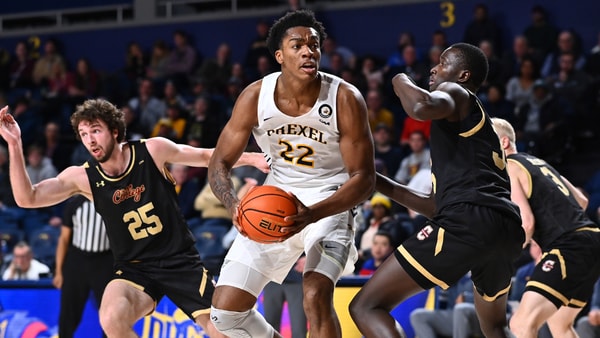
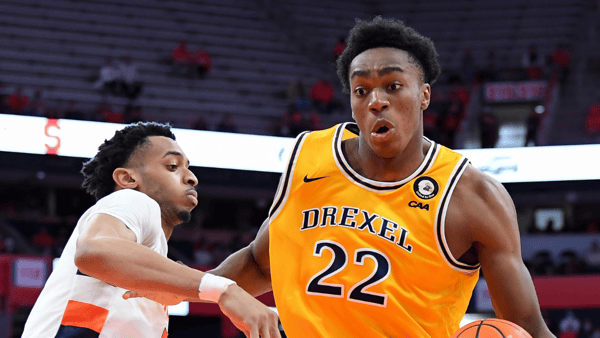
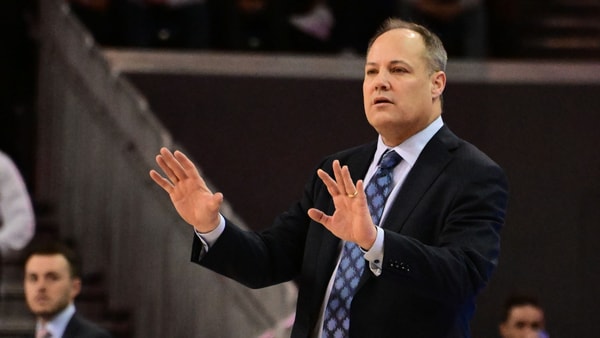
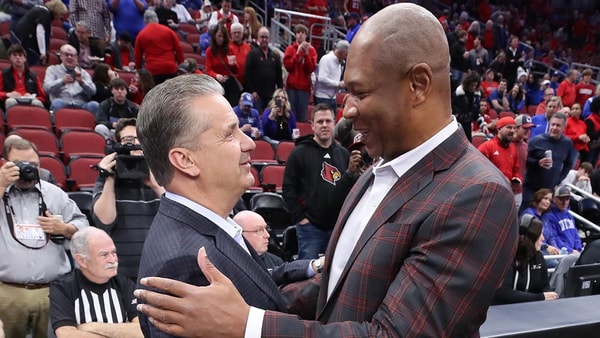
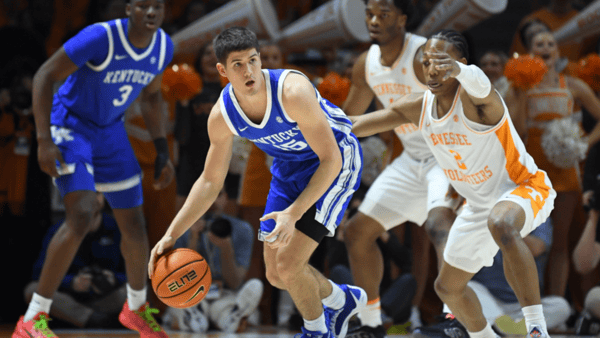
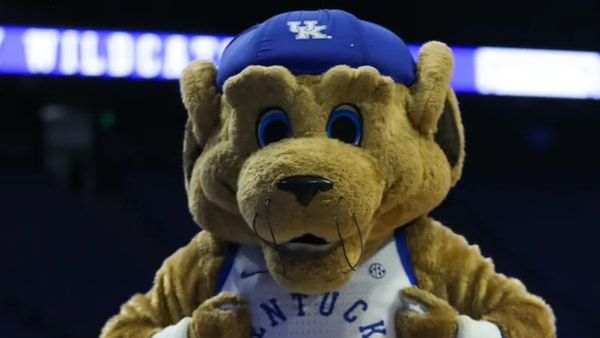
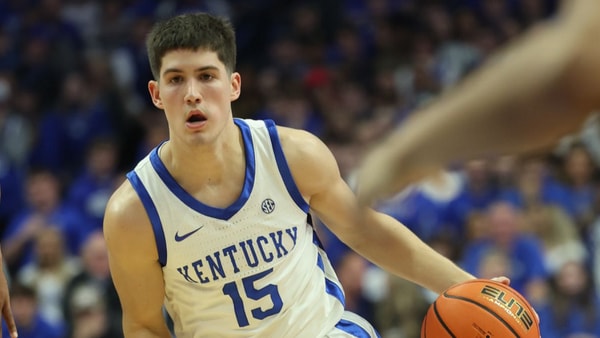
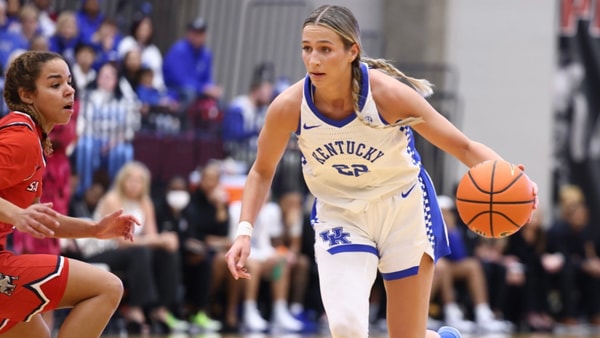
Discuss This Article
Comments have moved.
Join the conversation and talk about this article and all things Kentucky Sports in the new KSR Message Board.
KSBoard